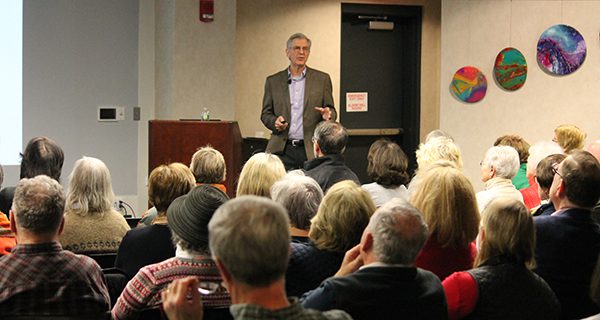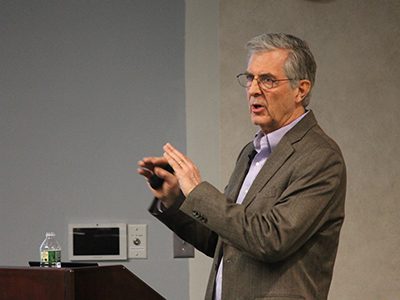[ccfic caption-text format="plaintext"]
By James Kinneen
Hometown Weekly Reporter
On Sunday afternoon, Tom Paine, a Harvard graduate and descendant of Declaration of Independence signer Robert Treat Paine, presented a historical presentation on his family’s unique impact on American history.
While Paine noted that Robert Treat Paine is “perhaps the least well known of Massachusetts’ founding fathers,” he is also one of the few founding fathers whose descendants directly participated in the Civil War. But while Civil War participants’ legacies have become an increasingly contentious issue, the Paine family has consistently found itself on what most people would consider the “right” side of history.
For example, although he is nowhere near as famous as Robert Gould Shaw, the Union colonel portrayed by Matthew Broderick in the film “Glory,” Charles Jackson Paine led a regiment of black soldiers to victory at the Battle of New Market Heights. These soldiers under his command became the first black men to win the Congressional Medal of Honor.
In a slide Tom Paine titled “Woke in 1865,” the audience read a letter in which Charles Jackson Paine goes so far as to rail against segregation.
The more interesting, but less accomplished Paine to fight in the Civil War was Sumner Paine, a cocky Harvard grad known for his hijinks while in college. Sumner Paine ended up at the Battle of Gettysburg, where before dying in an attempt to plug the gap at Pickett’s Charge, uttered his last words, which are reported to have been “isn’t this glorious.”
Tom Paine noted that because of this bravery and bravado, Sumner Paine was his childhood hero - although he is the lone skeptic in the family as to how valid the story is (it came from a letter a fellow soldier written to Sumner Paine’s father, who sought information about what happened to his son).
While three other Paine brothers fought in the Civil War, their actions were not as notable. But it is not just the Civil War heroics that makes Paine proud of his descendants - it is their charitable works, as well. Sumner’s sister, Frances Paine became Sister Frances Constance, and commited her life to helping vulnerable women. Robert Treat Paine II became immensely wealthy, but felt unsatisfied by the time he hits 35. As a result, he devoted his life to becoming a great philanthropist and peace advocate. He builds Trinity Church in Boston (which became the cornerstone of Copley Square), joined the “American Peace Society,” created the “Working Man’s Cooperative Bank,” and built affordable housing in Dorchester and Roxbury that stands to this day.
Tom Paine’s family has been uniquely impactful on American history. Luckily for us, that impact has been uniquely courageous, progressive and generous.
























